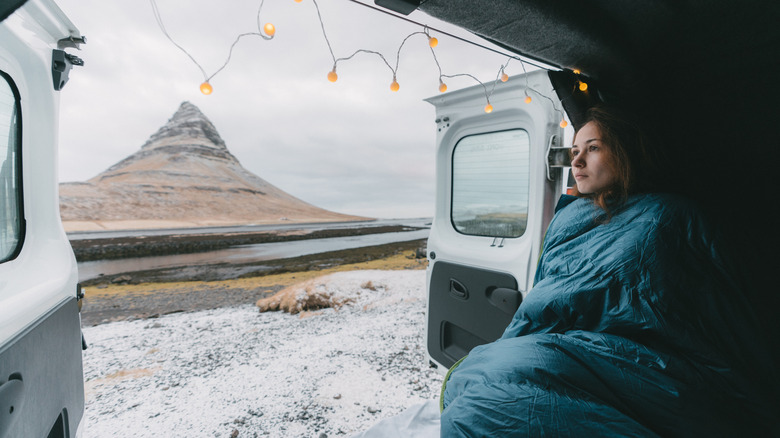Basic winter prep items for RV camping
Sometimes, the most obvious things get overlooked because we think, “There’s no way I’ll forget that!” But it does happen and can make us feel silly when we do. So, make sure to add these items to your checklist so you don’t forget them.
First up is sleeping bags. They aren’t just for tent camping and can be essential for staying warm overnight in your camper. Not only that, but a sleeping bag will also spare you from running your furnace or electric heater all night, which can be costly and noisy. Alternatively, you could consider using a heated blanket or mattress pad to keep you nice and toasty. If you want a low-tech alternative, use a rubber hot water bottle. You can fill this with boiling water and place it at the foot of your bed to keep you warm throughout the night.
Regardless of the weather report, always bring an ice scraper to clear your windshield and windows. This will be much better than having to MacGyver an ice-scraping tool or waiting for the heat inside your RV to melt the ice before you can leave. Lastly, this is less a tool than a tip, but make sure to scrape the snow off the top of your awnings if you have them out and off the top of your vehicles. It’s a common courtesy to other drivers and is even the law in some states.
Protect the essentials – battery, engine, and tires
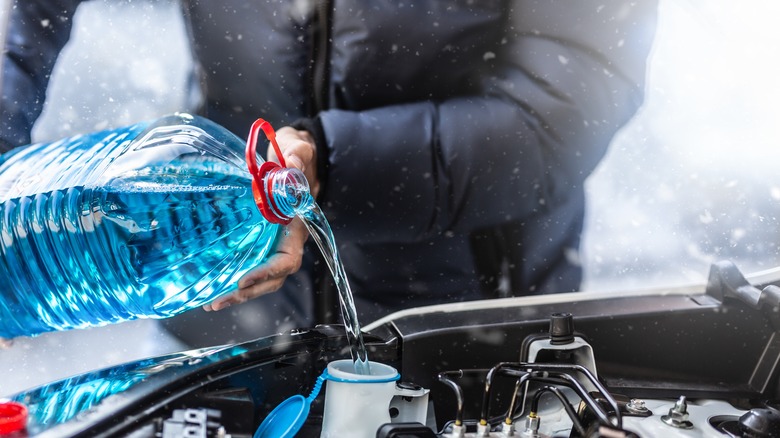
Now for the fun part — what to do about your battery, engine, and tires. These steps can feel intimidating if you’re a new RV owner, but it is straightforward once you know how to do it. First, keep your batteries from freezing. The simplest way is to ensure they’re fully charged and intact. If you see any signs of damage or corrosion, there’s a chance your battery could freeze, which won’t just mean you can’t start your vehicle, but you also may not be able to use other parts of your RV, such as the temperature controls. If you’re worried about your battery freezing, you can purchase a battery warmer.
Next, you also need to make sure you have the correct amount of antifreeze in your engine’s radiator. Without this, the water in your radiator might freeze and burst a line. Normally, the ratio is about 70% water to 30% antifreeze, but if you anticipate it will get below freezing at your campsite, change the ratio to 50:50.
Lastly, as you get into colder temperatures, your tire pressure will decrease (about 1 pound per square inch per 10 degrees of temperature change), so stop at a gas station and fill up your tires to the recommended tire pressure once you’ve gotten into cold weather. This is especially important if you’re coming from a warmer area.
Proper insulation is key
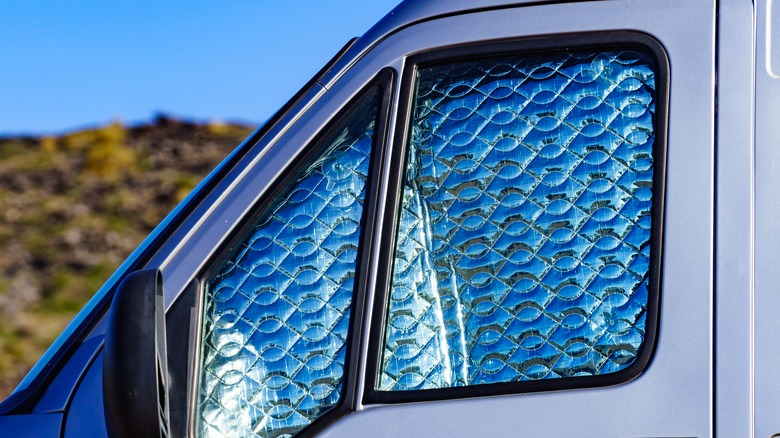
Voyagerix/Shutterstock
Though winter weather while camping can be fun, the whole point of having an RV is to have a little more of the creature comforts of home while still being in the great outdoors. If you have to stay bundled up in down coats and beanies even while inside, it can put a damper on the experience. To avoid this and keep the interior of your RV warm on cold nights, you need to invest in insulation.
First, you should get RV skirting — this means enclosing the undercarriage with a weather-resistant material — especially if you expect it to snow during your road trip and if more cold-weather camping is on the cards. RV skirting can be expensive, but it will keep snow from building up under your RV and also prevent cold air from blowing around your vehicle, which can bring the temperature down inside. If you’re not ready to invest in skirting just yet, you can purchase some foil-backed foamboard or hay bales to place under the perimeter of your RV.
Many RV’ers will use window inserts such as flexible aluminum foil insulation between the window glass and blinds to insulate from cold and heat. If you want to DIY your window inserts, bubble wrap will also insulate your RV. Don’t forget the insulation for your skylights and vents, but do make sure you get some airflow during the day to prevent moisture build-up inside.
Keep your water from freezing
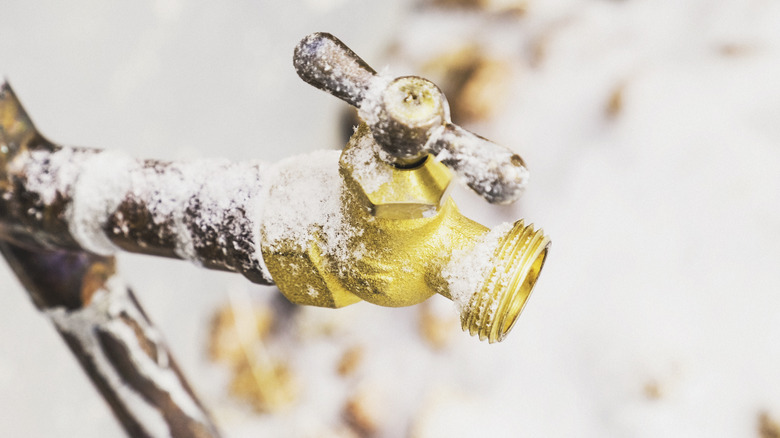
Catlane/Getty Images
Keeping the water in your RV from freezing is paramount to avoiding disaster on your vacation. If a water line freezes or (worst case scenario) bursts from the expanding frozen water, you’ve got a real problem on your hands. The best way to avoid this is by bringing heat tape with you.
Heat tape is an insulating tape that you can wrap around the water hose that extends outside of your RV, usually to a campsite water hookup. You can also apply the tape to the external valves on your RV or the campsite hose bib to prevent those areas from freezing. Alternatively, you can also purchase a water hose that is already insulated, but that will be more expensive. If you’re storing any extra drinking water in an outdoor storage bay under your RV, make sure to place it in an insulated bag to prevent it from freezing.
Stay warm and safe (and save a bit of money)
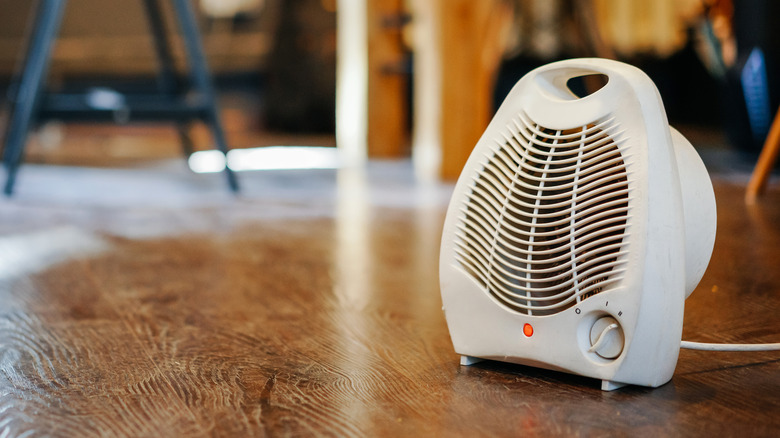
Dmitry Galaganov/Shutterstock
If your RV uses a furnace to heat your vehicle and water, check it a bit before your trip. Giving it a little dusting and checking the vents for blockages will ensure you have a safe and warm journey. When in doubt, have the furnace inspected by an expert if you suspect it’s not functioning properly. The last thing you want is to have your furnace fail while it’s snowing out.
If you’ll be staying at an RV campsite with electric hookups, you can save money by bringing a small electric heater instead of using up the propane for your furnace. Though you will pay for electricity at most campsites, these small electric heaters use very little power, are usually quieter than your typical RV furnace, and can keep it nice and warm through the night. Having that little extra heat in the morning can make waking up and moving easier.

